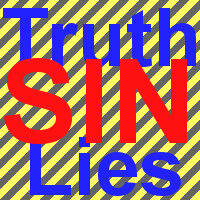Truth, Lies, and Sins
 I’ve been thinking a lot about truth lately.
I’ve been thinking a lot about truth lately.
For one thing, it’s been in the national news, for instance when Neil Newhouse, a senior advisor to presidential candidate Mitt Romney, told ABC news that, “We’re not going to let our campaign be dictated by fact-checkers.” That sounds a lot like a dismissal of the truth. Could that be because lying isn’t illegal?
I suspect that it would be a career-ender, or worse, for a campaigner to suggest that “we’re not going to let our campaign be dictated by judges,” or in any other way to suggest that following the law wasn’t supremely important. But, apparently, it’s okay to dismiss the truth.
This callousness about the truth — and the widespread willingness to accept compromises on the truth — is especially surprising in a culture marked by such catchphrases as “truth, justice, and the American way” (originally from Superman) and “the truth shall set you free” (from the New Testament book of John), and whose founding father is lauded because he could not tell a lie.
Truth has a distinguished history: Aristotle loved both Plato and truth, but demands the truth be put first (amfoin gar ontoin filoin osion protiman tin alitheian — “Nicomachaen Ethics” i.6.1), Cato promotes speaking truth even though it’s hard (vera libens dicas, quamquam sint aspera dictu — “Dicta Catonis”), and Cicero claims that seeking the truth is particularly human (hominis est propria veri inquisitio — “De Officiis” i.4.13). Confucius, too, is in favor of truth, arguing that those who hear the truth in the morning can die without regret in the evening (Analects vi.18). So why have we changed our attitude?
Again, is the problem that lying is legal?
I bring up legality because for some time I’ve been interested in the interplay between the law and ethics, and, in particular, the lack of a codified morality in America and other Western nations. People are allowed, even encouraged, to do anything legal, while it’s often okay to do something illegal if you don’t mind the penalty. (For example, I’m told that UPS truck drivers in New York City are told to park wherever they want, because the fines cost less than late deliveries.) Most modern Western citizens are so used to this mentality that they find it hard to imagine things being any other way.
But there are other approaches.
TEDx: Bible Translation and the Next Generation
The Ten Commandments are interesting in that they single out some laws as having moral content. Their point is that killing, for example, is a matter of both legality and morality. (I have more in this TEDx presentation.)
And all of this brings up an essay I wrote for We Have Sinned: Sin and Confession in Judaism, which was just released last week. Central themes of that book include the nature of sin, its role in our lives, and the modern relevance of some ancient prayers that list our sins — both those we have committed and numerous ones we haven’t.
My focus there (in addition to serving as chief translator) is what we learn from being bombarded by sins:
Once we accept that some things are wrong, we have to examine our behavior, even our legal behavior, more closely:The first [thing we learn from the Al Chet prayer about sins] is that some things are wrong. This basic Jewish tenet, so obvious to those who already know it, is neither intuitive nor universal. There are young children who take what they want only because they want it, never asking the deeper, Jewish question of Al Chet: “Is it right to do this?” For them, the world is divided not into right and wrong but, rather, simply into “what I want” and “what I don’t want.”
Most of us, after all, aren’t murderers. Our lives are more subtle. Deception is an accepted part of negotiation, but is there a point at which we might go too far? Can I lie to the police to avoid getting a traffic ticket? Violence is part of a successful defense of peace. Is it justified? Doling out punishment to children helps them navigate the world as adults. How strict should I be? Misleading the ones we love can be an invaluable gift. What do I tell the people I love? Again and again, we wonder: have we done the right thing?
My general point is that taking time to focus seriously on sin is more important now than ever, if for no other reason than we have to remember that some things — like lying, I suspect — are legal but still wrong.
For that matter, Thoreau wrote that “it takes two to speak the truth — one to speak, and another to hear.” Are we who put up with untruths as guilty as those who speak them?
What do you think? Is lying to get elected okay? Is deception as part of negotiation? Where do you draw the line? And how do you know?




